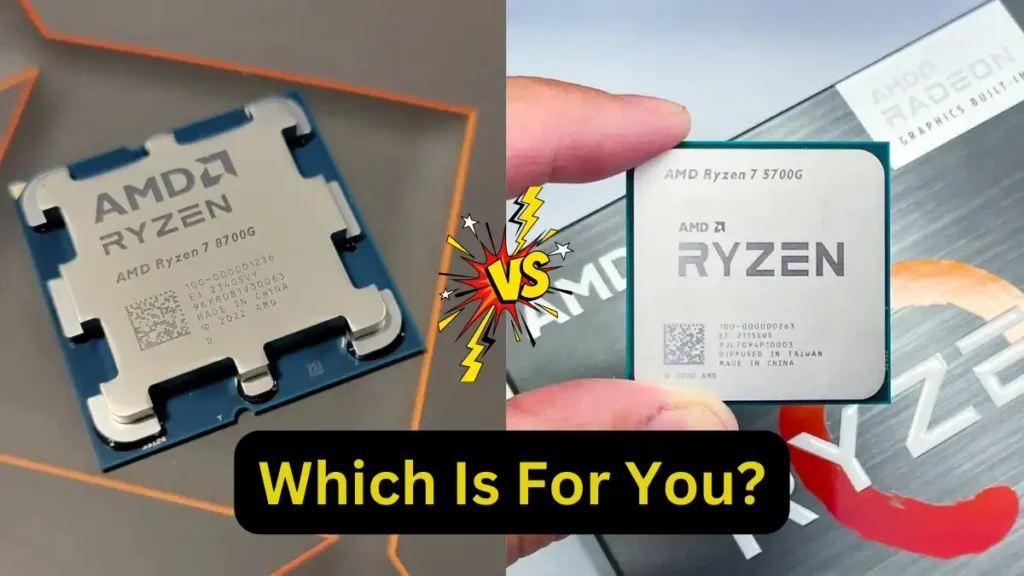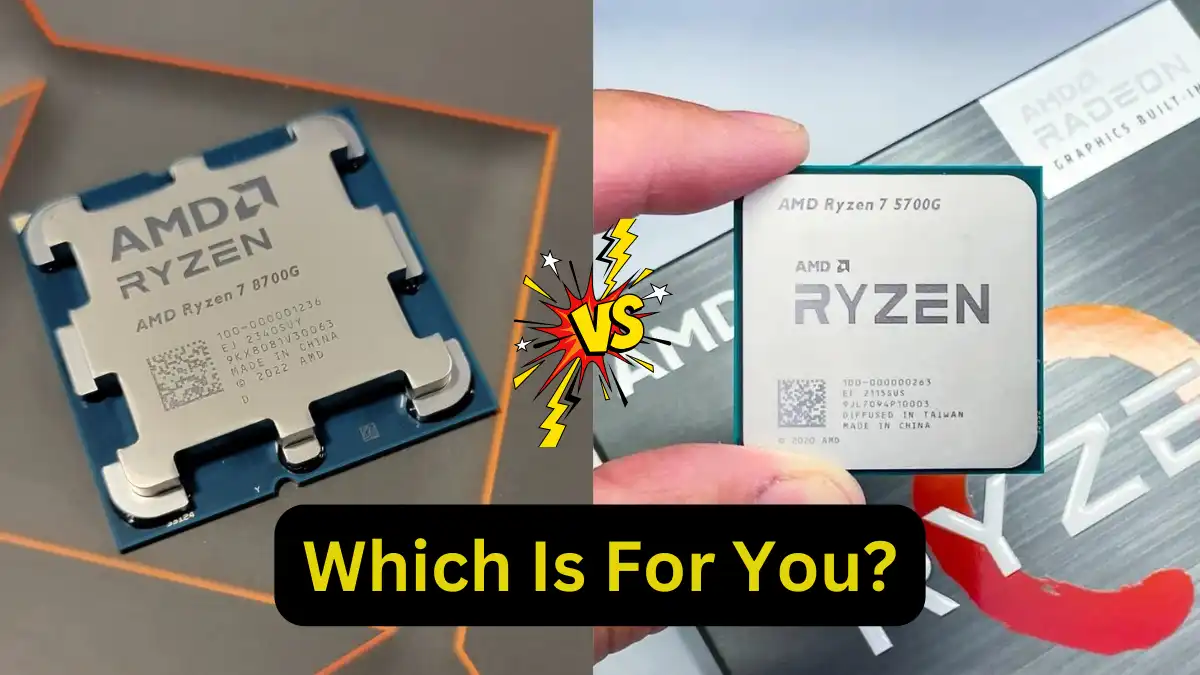AMD Ryzen 7 8700G vs AMD Ryzen 7 5700G: Today, we’re diving into the world of AMD processors, specifically the Ryzen 7 8700G and Ryzen 7 5700G. Think of them as the superheroes of your computer – they make things run smoothly and quickly. We’ll compare these two champs to help you figure out which one might be the best fit for what you need. So, buckle up, and let’s explore the cool features and differences between these AMD processors!

AMD Ryzen 7 8700G vs. AMD Ryzen 7 5700G
You’re considering two formidable contenders in the AMD Ryzen 7 arena: the 8700G and the 5700G. Both pack a punch, but which reigns supreme for your needs? Let’s delve deeper into their specs and key differences to guide your decision:
| Specifications | AMD Ryzen 7 8700G | AMD Ryzen 7 5700G |
|---|---|---|
| Process Size | 4nm | 7nm |
| Transistor Count | More (not specified) | Fewer (not specified) |
| Clock Speeds (Turbo) | Up to 5.1 GHz | Up to 4.6 GHz |
| Cache Sizes | Larger L2 cache per core | Smaller L2 cache per core |
| Integrated Graphics | Advanced architecture | Competitive integrated graphics |
| Thread and Core Count | 16 threads, 8 cores | 16 threads, 8 cores |
| Thermal Design Power (TDP) | 65W | 65W |
| PCIe and Memory Support | Possibly enhanced support | Supports, but may not be latest |
Performance Prowess:
- Raw Power: The 8700G flexes its muscles with a higher base and boost clock (4.2 GHz and 5.1 GHz respectively) compared to the 5700G’s 3.8 GHz and 4.6 GHz. This translates to faster processing for demanding tasks like video editing and 3D rendering.
- Future-Proofing: The 8700G leverages the cutting-edge AM5 platform and DDR5 memory support, offering a potential performance edge over the 5700G’s DDR4 compatibility and AM4 platform. However, DDR5 adoption is still nascent, with limited price-performance benefits at this stage.
Graphics Muscle:
- Integrated GPUs: Both processors boast integrated graphics, eliminating the need for a dedicated graphics card for basic tasks like web browsing and light gaming. However, the 8700G’s Radeon 780M boasts more cores and potentially higher clock speeds, offering a slight edge in graphical performance.
Cost Considerations:
- Price Tag: The 8700G’s newer technology comes at a premium. Expect to pay more compared to the 5700G, which might be more budget-friendly.
Platform Compatibility:
- Motherboard Matchmaking: Ensure your chosen motherboard aligns with your processor’s socket. The 8700G demands an AM5 motherboard, while the 5700G thrives on the more established AM4 platform. Consider existing components or upgrade plans when making your choice.
Power Consumption:
- Energy Efficiency: The 8700G’s higher TDP (65W) indicates slightly greater power consumption compared to the 5700G’s 65W TDP. Factor in potential cooling requirements and electricity costs when evaluating long-term usage.
Availability:
- Finding Your Match: The 8700G, being a newer entrant, might have limited availability compared to the more established 5700G. Consider the urgency of your purchase and potential wait times.
AMD Ryzen 7 8700G vs. AMD Ryzen 7 5700G – Performance
Checking how well the AMD Ryzen 7 8700G and Ryzen 7 5700G perform is important to understand what they can do for different tasks. Scores from a tool called Geekbench help us see how good they are at different jobs.
Geekbench Scores and Efficiency:
The Ryzen 7 8700G does much better in Geekbench scores compared to the Ryzen 7 5700G, showing it can handle tasks more efficiently. In single-core performance, the Ryzen 7 5700G scores 1855, while the Ryzen 7 8700G scores an impressive 2716 – that’s about 46% higher. For tasks using multiple cores, the difference is even bigger, with the Ryzen 7 8700G leading by about 52%.
Gaming Performance and Frame Rates:
In real gaming situations, like playing tough video games such as Cyberpunk 2077 and Far Cry, the Ryzen 7 8700G is better. It gives you higher frame rates and smoother gameplay. This happens because of the Ryzen 7 8700G’s faster CPU speed, allowing it to handle more demanding tasks efficiently.
Impact of Faster Clock Speeds:
The higher clock speed of the Ryzen 7 8700G adds to its better performance. It means each core can work faster, making it good for both gaming and professional tasks.
Temperature and Efficiency:
How hot the CPUs get is also crucial. Good temperature management makes sure the CPU works well, even when it’s doing a lot. The Ryzen 7 8700G might be better at spreading heat, keeping the performance stable without causing problems for the system.
Dedicated GPU and Memory Support:
When we talk about dedicated graphics cards, it’s important to see how well these CPUs work with them. The Ryzen 7 8700G’s design might offer better support for common types of RAM and graphics cards, making the whole system work better.
Conclusion:
To sum it up, the AMD Ryzen 7 8700G is a big step up in performance compared to the Ryzen 7 5700G, especially in gaming and demanding tasks. Its advanced features, like a speedy CPU and effective heat management, make it a strong choice for people who want top-notch performance.
AMD Ryzen 7 8700G vs. AMD Ryzen 7 5700G: Price
Deciding between the AMD Ryzen 7 8700G and Ryzen 7 5700G involves considering their prices and overall value. These processors cater to different budget ranges and deliver varying performance levels.
Initial Pricing and Market Position:
The AMD Ryzen 7 8700G, known for its powerful capabilities, was initially priced at $329, making it a competitive and high-performance option. On the other hand, the Ryzen 7 5700G entered the market at a slightly higher price of $359, positioning itself as a premium choice.
Current Market Dynamics and Value Proposition:
As the tech market evolves, the Ryzen 7 5700G’s price has dropped, making it more appealing for those seeking a balance between cost and performance. This reduced cost makes it one of the top options for users prioritizing powerful processing and better graphics without stretching their budget too much.
Comparing Performance to Price:
| Specification | AMD Ryzen 7 8700G | AMD Ryzen 7 5700G |
|---|---|---|
| Launch Price | $329 | $359 |
| Performance | Better due to newer technology | Solid performance, slightly lower than 8700G |
| Transistor Count | Higher count enhances performance | Lower count but still efficient |
| Multithreading | AMD’s Simultaneous Multithreading | AMD’s Simultaneous Multithreading |
| PCIe Support | Supports latest versions for faster transfer | Supports PCIe but may not be the latest version |
| Motherboard Compatibility | Limited to newer motherboards due to advanced features | Wider compatibility with various motherboards |
When comparing, the Ryzen 7 8700G excels in raw performance, especially for intensive tasks. Yet, the price drop in the Ryzen 7 5700G makes it a compelling and affordable alternative for those seeking a balance between cost and capabilities.
In the end, the choice depends on individual needs and budget constraints. The Ryzen 7 8700G is ideal for those wanting top-tier performance and the latest features, while the Ryzen 7 5700G, particularly with its reduced price, provides substantial value for those looking for a cost-effective yet robust solution.
Which Is Best For You?
Deciding which processor to buy, the AMD Ryzen 7 8700G or the Ryzen 7 5700G, ultimately depends on your specific needs and budget. Here’s a quick breakdown to help you choose:
Go for the AMD Ryzen 7 8700G if:
- You prioritize raw performance: The 8700G offers significant performance gains over the 5700G in both CPU and integrated graphics benchmarks.
- You’re willing to pay more for the latest technology: The 8700G boasts a newer 4nm architecture and slightly higher clock speeds.
- You plan to upgrade your motherboard anyway: This processor requires the newer AM5 platform, which may incur additional costs.
Choose the AMD Ryzen 7 5700G if:
- Budget is a major concern: The 5700G is generally more affordable and readily available.
- Motherboard compatibility matters: You have more options with the AM4 platform supported by the 5700G.
- Moderate performance suits your needs: The 5700G still offers solid performance for multitasking, light gaming, and basic content creation.
VISIT HOMEPAGE FOR MORE ARTICLES
